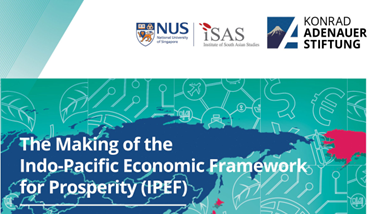The EU, the Indo-Pacific and the US-led IPEF: Which Way Forward?

The paper provides a European Union (EU) perspective on the Indo-Pacific Economic Framework (IPEF).
First, the recent progress made by the IPEF has given new momentum to the EU’s engagement with the Indo-Pacific (IP) partners and to its recently launched Indo-Pacific strategy.
In terms of substance, two issues appear to be at the forefront of the IPEF as well as of the EU’s Indo-Pacific strategy, namely supply chain resilience enhancement and various aspects of the digital economy.
There is probably scope for convergence and cooperation between the EU and the IPEF countries on the former issue, which is addressed indirectly in different EU’s digital partnerships, while it is the area where the IPEF has made most substantial progress.
However, the differences between the EU’s and the United States’ (US) approaches to some aspects of the digital economy may act as stumbling blocks and give rise potentially to some form of competition in the IP region, making cooperation on data-based efforts to enhance supply-chain resilience rather complicated.
> Read the whole chapter on the website of the Konrad Adenauer Shiftung.

Available in:
Regions and themes
Share
Related centers and programs
Discover our other research centers and programsFind out more
Discover all our analyses
China’s Strategy Toward Pacific Island countries: Countering Taiwan and Western Influence
Over the past decade, China has deployed a diplomatic strategy toward the Pacific Island Countries (PICs). This strategy pursues two main objectives: countering Taiwan's diplomatic influence in the region and countering the influence of liberal democracies in what Beijing refers to as the "Global South."

Opening up the G7 to South Korea to Address Contemporary Global Challenges
The G7’s global influence has diminished as powers like China reshape international governance through initiatives such as BRICS and the Shanghai Cooperation Organisation (SCO). With the G7 now representing just 10 per cent of the world’s population and 28 per cent of global GDP, its relevance is increasingly questioned.
Expanding SPDMM as a pivotal institution in the Pacific – A French perspective
The South Pacific Defence Ministers’ Meeting (SPDMM) is the only forum that brings together defense ministers from the wider South Pacific — including Chile, which is hosting it for the first time. This heterogeneous group of countries with varying resources, capacities, and interests — Australia, Chile, Fiji, France, New Zealand, Papua New Guinea (PNG), and Tonga — are united by their shared determination to strengthen cooperation on maritime security and humanitarian assistance and disaster relief (HADR) activities.
EU’s Derisking From China: A Daunting Task
With economic security as a major concern, the EU has recently turned to “derisking” from China. The EU strategy entails reducing critical dependencies and vulnerabilities, including in EU supply chains, and diversifying where necessary, while recognizing the importance and need to maintain open channels of communication.










